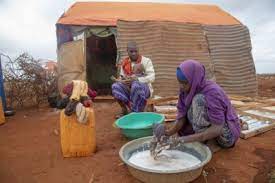Nigeria’s Vice President Prof. Yemi Osinbajo, says Africa has the potential to change the narrative and become the solution to the net zero ambitions of the entire world.
Osinbajo made this submission on Sunday, April 30 in Kenya, while speaking at a meeting tagged Africa-Europe Earthshot: 2023 Milestone Map with the theme, “Unlocking Investment for a Just Energy Future.’’
The Nigerian vice president says he fully endorses the idea of setting the agenda for the cooperation being talked about; the Africa-Europe cooperation on a just energy future.
According to him “I think that agenda is important – the Climate Positive Growth Agenda – that we have heard; and I think in the past couple of days, it has been exciting to hear President William Ruto speak so eloquently and so articulately,” he said.
“For me, the next steps are crucial; first, we need to get African governments and heads of state around this agenda and that is crucial because it is one climate positive that is a win-win situation for Africa and the rest of the world.
“It certainly needs a lot of fleshing out and a lot more in terms of getting African governments in particular to understand our place in it and how to take this forward.
“Every government already has a plan; in Nigeria for example, we are not probably a country you think of when it comes to a green economy but the truth is that Nigeria’s hydropower has the core of its energy resources.
“Our Energy Transition Plan as well as renewable energy plan both emphasise great ambitions for renewable energy.’’
Prof. Osinbajo said that, as a gas-rich country, the question should be how Nigeria would be able to emphasize the trade-offs and the actual benefits.
The vice president reiterated that there was a need to present to each government, where the benefits and trade-offs might lie so that consensus could be reached quickly and effectively.
Net zero entails reducing greenhouse gas emissions to as close to zero as possible while the remaining emissions are re-absorbed from the atmosphere.
The session was part of activities lined up for the 2023 Mo Ibrahim Governance Weekend organized by the Mo Ibrahim Foundation.
By Dare Akogun





